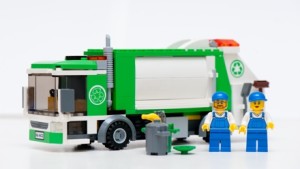The Innovation Garbage Truck
 Every year, I head up to Sandusky, OH with some friends to ride roller coasters at Cedar Point. The 2012 instance of the trip happened to be the 11th trip for this group of us and I had gone with them on all but 2 of those trips. Its a great time and one I hate to miss for any reason.
Every year, I head up to Sandusky, OH with some friends to ride roller coasters at Cedar Point. The 2012 instance of the trip happened to be the 11th trip for this group of us and I had gone with them on all but 2 of those trips. Its a great time and one I hate to miss for any reason.
The first few years we went, there was a Sanitation Engineer competition that was held in the back parking lot of the amusement park the same weekend we were there. Gabe, the guy who organizes the trip, and I tend to get into mischief on these trips and after walking past the garbage trucks for a couple years, we decided one evening that we really needed to climb one. The two of us were about half-way up the ladder when a voice boomed out from the shadows, telling us to get down right this instance. Since we're really good guys at heart, we obeyed the voice, apologized to it and went on our merry way.
That story is really my only experience with physical garbage trucks, but every day I spend a great deal of time with a metaphysical garbage truck; the one that hauls away and disposes of the myriad bad ideas that come to my mind. When I was interviewing for a job that had a lot to do with innovation, I made the following statement:
I expect to at least look at 100 new ideas this year. Of those 100, I expect that 90 of them won't even be good enough to make it past my filter. Of the remaining 10 that you hear about, of those we'll discard 9 as being either wrong for us or just plain wrong. Its that last 1 idea that will be a winner. The hard part is making sure that we're picking the 1 and not any of the other 99.I'm not the only one who feels this way. One of my heroes, Alan Cooper, feels the same way:
A small fraction of my good ideas made it to market, but time spent on good ideas is never wasted. There’s always abundant insight to be gleaned from working on a promising thought, and sometimes working on an auspicious idea can lead to other, even better ones.Alan sees the process of being innovative as one big garbage disposal problem; how to economically get rid of the bad ideas and keep the good ones. He's right in that this is a hidden cost to innovation, but I think he needs to go a bit further in that this hidden costs is an up front cost that can diminish over time.
One of the things about failure, in this case a failure to quickly and accurately identify a bad idea, is that it presents an opportunity to teach you about how to identify bad ideas in the future. No one is going to be perfect about this, but misidentifying a bad idea now may result in catching and discarding many more in the future. This is why it is so important for all of us to drive the innovation garbage truck and haul away all those bad ideas.
Lets face it, many of us (although not I) are hoarders. There is even a TV show dedicated to people who have a clinical problem with throwing things out. We get attached to objects and ideas; they become our children, something we are loathe to part with even when separation is necessary. Yet this discarding of bad ideas is precisely what allows us to learn what makes a good idea from what makes a bad one. It gives us context in which to make our future decisions.
Yes, there is an opportunity cost, just as Alan Cooper says, incurred every time we investigate a bad idea. We cannot get that time back, but we can make it count by using that experience the next time a bad idea comes our way.
Drive that garbage truck. Take out every bit of trash you can. Be ruthless not just with the ideas of others, but especially ruthless with your own. If you're not running out of places to inter the bodies of bad ideas, you are doing it correctly.